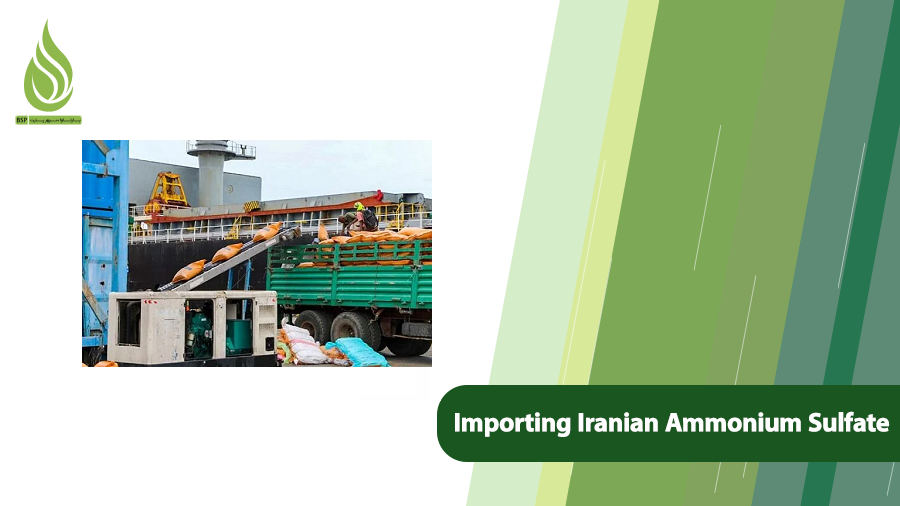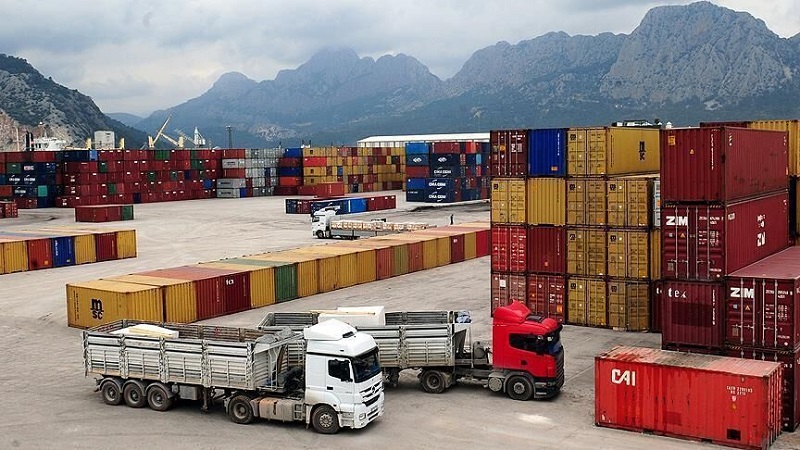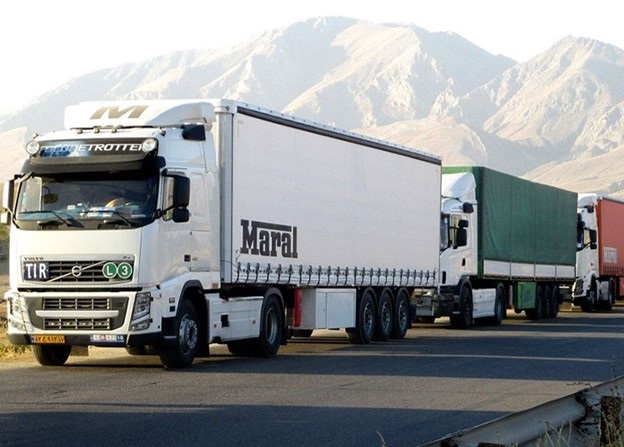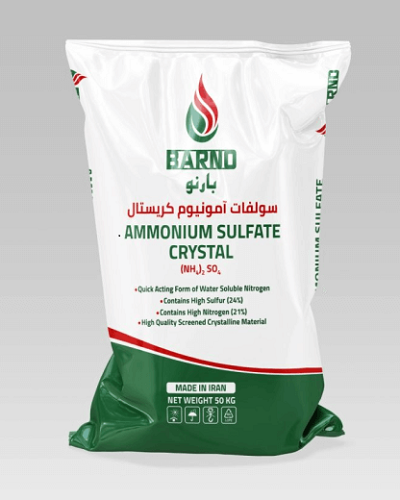
Why Iraqi Farmers Rely on Importing Iranian Ammonium Sulfate?
Sharing the longest land border among its neighbors, Iran enjoys a unique trade relationship with Iraq. This proximity fosters strong commercial ties, with both governments actively supporting cross-border trade. They’ve streamlined regulations and logistics to make it easier for goods, including agricultural products, to flow between the two countries. For Iraq, which has been boosting its agricultural sector, this partnership is vital for accessing essential supplies like fertilizers. Let’s take a look at the process of importing Iranian ammonium sulfate to Iraq.
Iran stands out as a leading exporter of chemical and agricultural products in the Middle East, delivering high-quality goods to nations like India, Turkey, China, Armenia, Jordan, the United Arab Emirates, and Iraq. Its robust production capabilities and strategic location make it a go-to supplier for many countries, especially its neighbor, Iraq.
Why is Iranian Ammonium Sulfate Popular Among Iraqi Farmers?
- Geographical Advantage: Iran’s closeness to Iraq significantly lowers transportation costs compared to far-off suppliers like Turkey, China, or India. Goods can be shipped quickly and affordably, often via land routes, saving time and money for Iraqi buyers.
- Superior Product Quality: Iranian ammonium sulfate, available in crystalline and granular forms, is well-suited for Iraq’s alkaline soils, which are common in regions like the Kurdistan Region and central Iraq. These products deliver the nitrogen and sulfur farmers need to boost crop yields effectively.
- Cost-Effective Pricing: Iran’s lower production costs allow it to offer ammonium sulfate at competitive prices. This affordability is a major draw for Iraqi farmers, who need high-quality fertilizers without straining their budgets.
- Seamless Trade Routes: The shared land borders, particularly those in the Kurdistan Region, simplify the import process. Efficient customs procedures and well-established transportation networks ensure that Iranian fertilizers reach Iraqi markets with minimal delays.
Iraqi farmers are looking for fertilizers that strike a balance between affordability and performance. Iranian ammonium Gov. Ammonium sulfate meets these needs, offering a reliable, high-quality solution at a price that makes sense for Iraq’s growing agricultural sector. This combination of quality, cost, and convenience has solidified Iran’s role as a trusted supplier in the region.

Key Specifications for Importing Iranian Ammonium Sulfate to Iraq
Iraqi farmers and importers prioritize ammonium sulfate that meets specific standards to ensure it performs well in their fields and greenhouses. The following features are most sought after in the Iraqi market:
- Granular Form for Easy Use: The granular version of ammonium sulfate is preferred because it’s easier to spread across large fields and greenhouses, ensuring even application. However, some importers, particularly those with specialized needs, choose the crystalline form, which is also readily available from Iranian suppliers.
- High Nutrient Content: The fertilizer must contain at least 20.5% nitrogen and 23-24% sulfur to meet international export standards. These nutrients are critical for boosting crop growth, especially in Iraq’s alkaline soils, which benefit from sulfur to improve soil fertility.
- Clean and Pure Product: The ammonium sulfate must be free of contaminants like chlorine or heavy metals, which could harm crops or soil health. Purity is a top concern for Iraqi buyers to ensure safe and effective use.
- Durable, Moisture-Resistant Packaging: To withstand transportation and storage in Iraq’s varied climate, the fertilizer is typically packed in sturdy, moisture-proof bags, usually in 25- or 50-kilogram sizes. This ensures the product remains usable even after long journeys or extended storage.
How Ammonium Sulfate is Exported from Iran to Iraq
Exporting ammonium sulfate from Iran to Iraq is a well-established process, supported by the strong trade relationship between the two countries. There are three primary methods for getting this fertilizer to Iraqi markets, each with its own advantages:
- Direct Export from Manufacturer to Buyer: In this approach, an Iranian producer ships the ammonium sulfate directly to an Iraqi trader or buyer. This method is the fastest and most cost-effective, as it cuts out middlemen. However, it requires the supplier to have proper export permits and coordinate closely with customs authorities on both sides to ensure smooth delivery.
- Export Through Trading Companies: Many Iranian trading firms specialize in exporting agricultural products and act as intermediaries between producers and Iraqi buyers. These companies handle the logistics, paperwork, and customs processes, making this a convenient option for buyers or producers who lack export licenses or experience in cross-border trade.
- Export via Free Trade Zones: Some exporters route their shipments through Iran’s free trade zones, such as Maku or Arvand, before sending them to Iraq. In these zones, goods face simpler customs procedures and fewer regulatory hurdles, which can speed up the export process and reduce costs. This method is particularly popular for large-volume shipments.

Key Land Borders for Shipping Fertilizer to Iraq
Iran and Iraq share multiple land border crossings that serve as vital gateways for exporting goods, including fertilizers like ammonium sulfate. These customs terminals are equipped to handle the steady flow of trade between the two countries. The most prominent terminals include Arvandrud, Mehran, Shalamcheh, Sheikh Saleh, Tamarchin, Khosravi, Parvizkhan, Haj Omran, and Bashmaq, each playing a critical role in facilitating cross-border commerce.
The following border crossings are the most active for exporting ammonium sulfate from Iran to Iraq, each offering unique advantages for reaching specific regions:
- Parvizkhan Border (Qasr-e Shirin, Kermanshah Province)
- The busiest crossing for trade with the Kurdistan Region.
- Perfect for delivering goods to major cities like Sulaymaniyah and Erbil.
- Equipped with robust warehousing and transportation infrastructure, ensuring efficient handling of large shipments.
- Bashmaq Border (Marivan, Kurdistan Province)
- A direct link to Sulaymaniyah Province, making it a hub for agricultural trade.
- WideThe ly used for shipping chemical products and fertilizers due to its reliable logistics network.
- Mehran Border (Ilam Province)
- Connects to Wasit Province and extends to southern Iraq, a key agricultural region.
- An excellent choice for sending fertilizers to Iraq’s southern markets, where demand is growing.
- Tamarchin Border (Piranshahr, West Azerbaijan Province)
- Serves Duhok and northern Iraq, offering access to less congested routes.
- Ideal for smaller or time-sensitive shipments, as it’s less crowded than other crossings.
Transporting ammonium sulfate by land, using heavy-duty cargo trucks like ten-wheelers or transit trucks, is the most practical and cost-effective method. These trucks can navigate the well-established road networks connecting Iran and Iraq, ensuring timely deliveries to farmers and distributors across the border.
Essential Documents for Importing Iranian Ammonium Sulfate to Iraq
Importing Iranian ammonium sulfate to Iraq requires careful preparation to meet the regulatory requirements of both countries. Before any shipment begins, the Iranian seller and Iraqi buyer must sign a detailed contract that clearly spells out all terms, including pricing, delivery schedules, and product specifications. This contract serves as the foundation for a smooth transaction.
The Iranian side must secure several permits from relevant authorities, which can vary depending on the product. Below is a comprehensive list of documents required for both parties to successfully import ammonium sulfate:
Documents Required from Iran:
- A valid commercial registration card to verify the seller’s legitimacy.
- An export permit from Iran’s Ministry of Industry, Mine, and Trade, authorizing the shipment.
- Customs permits to clear the goods for export.
- Approval from Iran’s Standards Organization, confirming the product meets quality standards.
- An official invoice and detailed packing list, outlining the shipment’s contents and quantities.
- A manufacturer’s certificate, verifying the product’s origin and production details.
- A packing list specifically formatted for export to Iraq.
- A Certificate of Origin from the Chamber of Commerce, issued in Arabic or English, to confirm the product’s Iranian origin.
- Product labels designed or translated into Arabic for Iraqi consumers.
- A bill of lading and insurance certificate to cover transportation risks.
- Any additional valid documents required by customs or trade authorities.
Documents Required for Iraq:
- A Certificate of Analysis (COA), detailing the product’s chemical composition and quality.
- Approval from the Iraq Standards Organization, if mandated for the specific shipment.
- A letter of introduction from the Iraqi importing company, establishing its credentials.

If all required documents are complete and the terms of the transaction unpacked, customs procedures can be finalized in less than three days.
Steps for Importing Iranian Ammonium Sulfate to Iraq
The process of importing Iranian ammonium sulfate from Iran to Iraq generally involves the following steps:
- Obtain an Import Permit: Secure an import permit from Iraq’s Plant Protection Organization to authorize the importation of fertilizers.
- Research Reputable Manufacturers: Identify trusted Iranian producers of ammonium sulfate by evaluating their reputation and reliability.
- Compare Product Specifications: Analyze different manufacturers’ products based on composition (e.g., nitrogen and sulfur content), pricing, and other relevant factors.
- Contact a Reliable Manufacturer: Reach out to a reputable ammonium sulfate producer to place an order and discuss details.
- Sign a Contract: Finalize a contract with the Iranian supplier, specifying transportation methods, payment terms, and other conditions.
- Make Payment: Complete the payment as outlined in the contract.
- Await Shipment: Wait for the shipment to be dispatched from Iran.
- Clear Customs in Iraq: Handle customs clearance by submitting the import permit, invoice, bill of lading, and proof of payment for clearance fees. The shipment will be inspected at the customs terminal to ensure it matches the declared information.
Finding a reliable manufacturer in Iran can be challenging for some Iraqi traders and importers. In the past, Iraqi buyers often traveled to Iran to meet producers or suppliers in person. Another common approach was attending agricultural trade shows to connect with sellers. However, in today’s digital age, buyers can find Iranian ammonium sulfate suppliers through reputable websites, LinkedIn, or by directly contacting manufacturers via phone or email to purchase the desired product.
Conclusion
Iraq’s agriculture sector faces challenges such as limited access to modern machinery, insufficient water supplies, and a shortage of high-quality fertilizers. With the growing demand for chemical fertilizers, particularly ammonium sulfate, importing this product from Iran presents a golden opportunity for Iraqi farmers and traders. Iran’s geographical proximity, low transportation costs, access to multiple border crossings, strong trade relationships, and understanding of Iraq’s market needs make the import process smooth and efficient.
By adhering to customs regulations, drafting clear contracts, choosing the right border crossing, and planning transportation carefully, traders can establish a consistent and profitable presence in the Iraqi market. Given that laws and regulations frequently change, it’s essential to stay informed about the latest updates to ensure compliance.